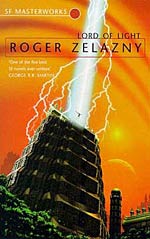
![]() Rabindranauth@DDR
Rabindranauth@DDR
10/6/2014
![]()
The legendary SF classic that was even more enjoyable than I expected it to be. Roger Zelazny perfectly melds two major Eastern religions with a tale of politics and betrayal as epic as they come.
On a distant planetary colony, a group of people harness the advanced technology at their fingertips to become gods of this brave new world, creating a Deicratic system of worship with the Hindu pantheon as their godly forms. By stifling innovation and reinforcing it with the martial might their advanced technology gives them, they have successfully trapped the world in a Dark Age, in which they rule supreme. But not all who came on the ships wish to see the world subject to the whims of the colonists. At the helm of the Accelerationist movement, dedicated to sharing technology to raise the standard of living for all, and in direct opposition to the Celestial City stands Sam, known as Matreiya, Binder, Mahasamatman, and Siddhartha, the Lord of Light.
When I first picked this up, I expected it to be a spiritual/philosophical tale at heart. After all, that's what the average person thinks when they think of Hinduism, Buddhism, and Eastern mysticism in general, right? And that became the first surprise. Zelazny eschews my expectations and instead the philosophy and spirituality plays second fiddle to a tale of war and religion, betrayal and passion that takes place both on a grand scale and a personal level. It quite literally reads like your average genre fantasy novel, even taking place in a fantastical setting, except it is a world heavily influenced by the dominant Hindu lore and reinforced with the magic of fictional science.
Simply put, if you've read any epic fantasy before, you're not going to read anything new in the meta-plot here.
But it's not the plot that made Lord of Light stand out for me, but how perfectly Zelazny captures Eastern philosophy and incorporates it into his tale. A few months ago I actually read Herman Hesse's Siddhartha, and there are large swaths of this book that seem like they can be extracts of that. He perfectly duplicates the sensation that such an indepth portrayal of philosophy and spirituality created over the course of Lord of Light, and that adds an air of reality to his tale for me. Everything from the re-establishment of Buddhism to the philosophy and spirituality that are seeded throughout this tale have a very authentic feel to it, that I could not help marvelling at.
Because a large portion of the book is dominated by the plot, it's easy at first to overlook what an excellent depiction of the nature of religion itself this book highlights. From the viewpoints of the inhabitants of the Celestial City, we get a look at the power religion can have when it serves the purposes of a select group of individuals. From Sam, the questions and choices one faces when religion conflicts with our personal morals and beliefs. And most interestingly enough, Rild, Kali's holy assassin, for the life changing power it can have on one who truly believes in it.
Before reading this, I made sure to check out a few reviews around the Web as always, and a common issue folks seem to have with Lord of Light that I made note of to not only carefully read to form my own conclusions, but to address in my review, is Zelazny's choice of Hinduism as the dominant religion. Folks generally seem to think it's completely ridiculous for colonists to establish a form of Hinduism as a dominant religion. Why? Because obviously Christianity. Therefore, the entire book is patently absurd. Which makes the one line Zelazny specifically dedicates to that little plot hole all the more easy to overlook, and also all the more important.
The colonists aren't white, Bible thumping folk. They're clearly referred to as Indians.
So what precisely is so absurd about Hindus establishing Hinduism where Christians would have established Christianity? This is a disparity highlighted even more by the existence of both Olvegg and Nitritti, who are clearly mentioned, multiple times, as being Christians. But I guess where it comes to a tale involving a minor religion such as Hinduism, where the majority of readers would be from a Christian background, if any, words such as 'absurd' and 'ridiculous' should be expected. If I continue on this train of thought, this entire review's going to devolve into one vicious, vitriol soaked rant on the asinine intolerance of Christianity to other faiths, so I'm moving on. I think I've made my point.
All in all, I found Lord of Light to be an engagingly written story I couldn't help but enjoy, that not only takes an interesting look at religion and the consequences of it, but also does an incredible job of combining Eastern mysticism with an engaging plot to create what truly is a legendary tale. For a book so widely lauded, I actually expected something of a much more speculative nature, but this by no means is a complaint, as I think the look it takes at religion more than makes up for any out of the box concept it could have portrayed. If you have this on your list of books to read, you're in for a treat. If you don't, you should have it.
http://drunkendragonreviews.wordpress.com/